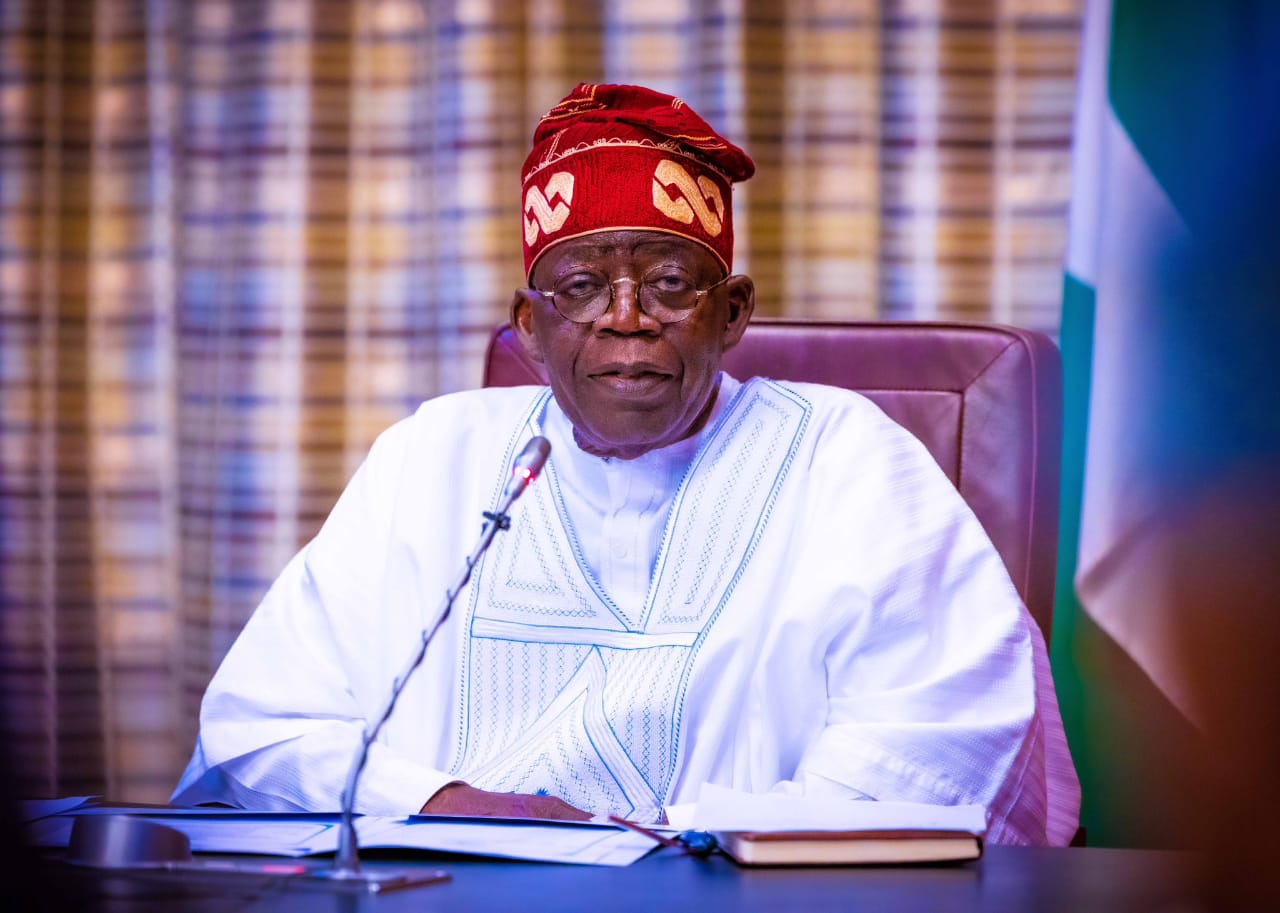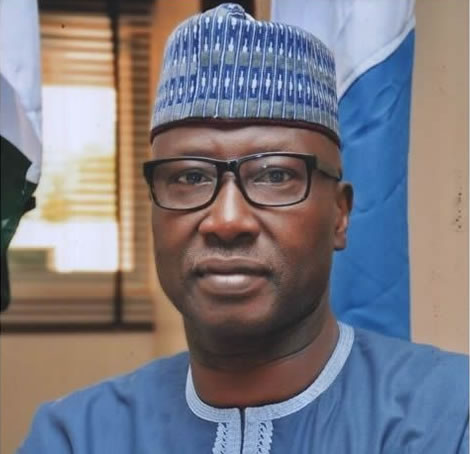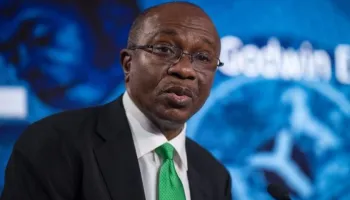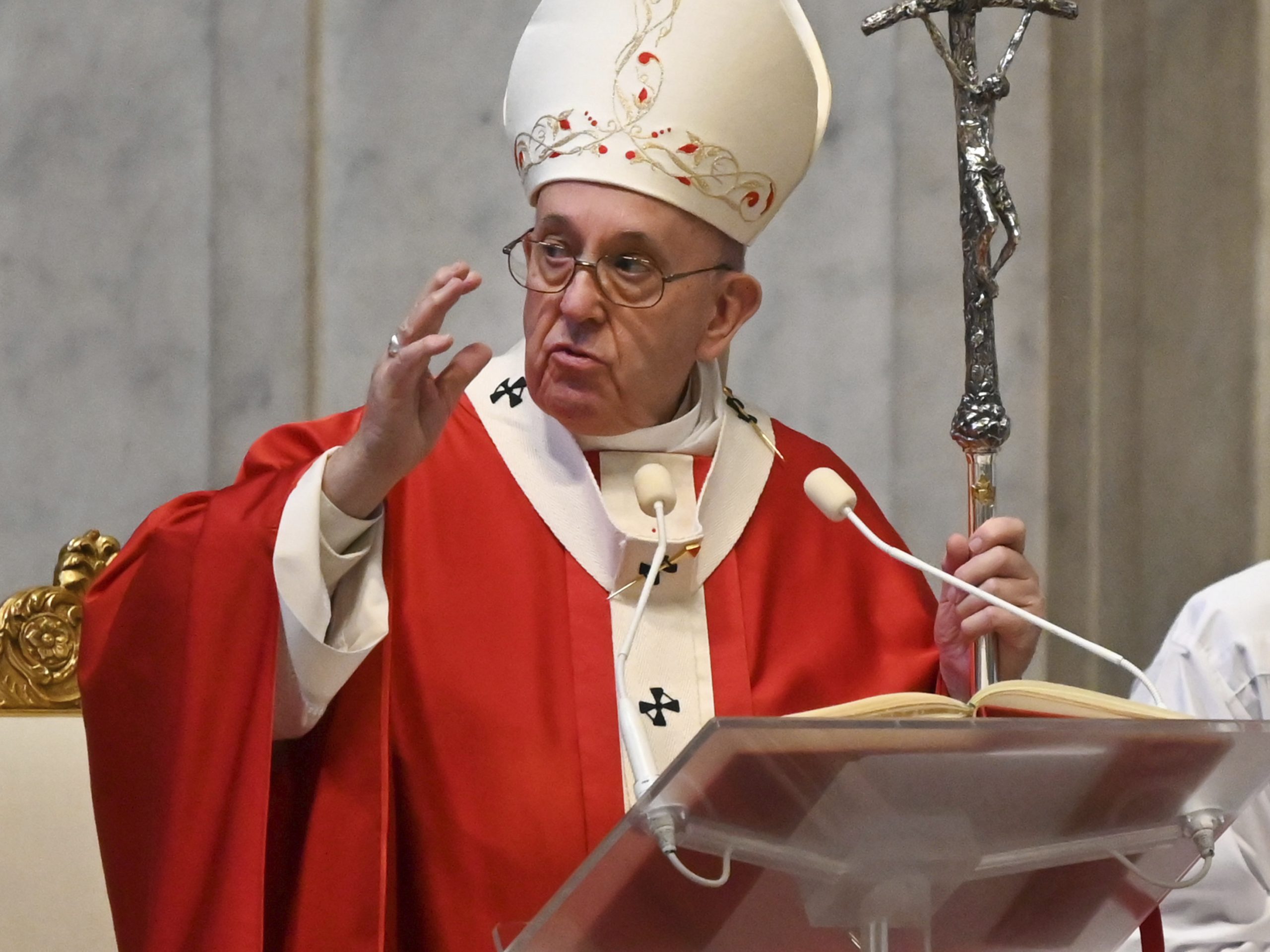COVER
Buhari Ends Eight – year Tenure with Valedictory Cabinet Meeting

By Mathew Dadiya, Abuja
President Muhammadu Buhari technically ended his eight-year tenure as he presided over a valedictory session of the Federal Executive Council (FEC).
The Council consideration its last memorandum as tenure of the administration elapses in five days on Monday, May 29.
The meeting was intended for Ministers to put finishing touches, to a number of documents as well as treat outstanding issues from the various government Ministries, Departments and Agencies ahead of the exit of the administration next Monday .
Yesterday’s FEC meeting held behind closed doors in the Council Chamber of the Presidential Villa, Abuja was characterised by a flurry of activities with a rash of last-minute approvals and appointments.
Before the valedictory session, which was preceded by exchange of banters among cabinet members, President Buhari performed the swearing-in of seven Federal Commissioners of the Revenue Mobilisation, Fiscal and Allocation Commission (RMFC).
Those sworn- in by the President before commencement of the valedictory session were Peter Okpara (Imo), Senator Ayogu Eze (Enugu), Kolade Abimbola (Oyo), Rekiya Ayuba-Haruna (Kebbi), Hauwa Aliyu (Jigawa), Ismaila Agaka (Kwara), and Amb Ayuba Ngako representing the FCT.
The Council also received the key highlights of the report of the Health Reform Committee headed by Vice President Yemi Osinbajo.
The Committee was put in place to develop a roadmap to achieving Universal Health Coverage in the country.
Among its recommendations include improving funding of the health sector above 10 percent.
Minister of State, Unconstitutional, Says Keyamo
The outgoing Minister of State for Labour and Employment, Festus Keyamo, has told President Muhammadu Buhari that it was an out of the law of the nation to appoint a Minister of State.
Keyamo stated this on Wednesday, during the valedictory session presided over by President Buhari to mark the end of the Federal Executive Council (FEC), under the current administration at the Council Chamber, Presidential Villa, Abuja.
The Minister of State, who commended the President for enriching his Curriculum Vitae, through the appointment, noted that some other Ministers of State, have been grumbling and unable to be bold and speak out.
He said it would be difficult to assess the individual performances of the Ministers of State since their discretion was shackled under the discretion of the ‘superior Ministers’ as any original ideas developed by a Minister of State are subject to clearance by another colleague in Cabinet before they can sail through for consideration by Council.
His text read: “Mr. President, you first appointed me as Minister of State in the Ministry Niger Delta Affairs in August, 2019 and you later redeployed me as Minister of State in the Ministry of Labour and Employment.
“Today, I cannot find the words to express the depth of my gratitude to you for finding me worthy, out of over two hundred million Nigerians, to be nominated and subsequently appointed to serve as a Minister of the Federal Republic of Nigeria. My curriculum vitae has been greatly enhanced – forever.
“From my very humble beginnings in a small dusty town in Delta State where I was born and raised by my struggling parents, all the way to the Council Chambers at the Presidential Villa where I had the honour and privilege to participate weekly in decision-making for my country in the last four years, it has been like a fairy tale. I give God all the glory.
“What I am about to say, therefore, is not and should not be construed as an indication of ingratitude. Far from it. What I am about to say is just my own little contribution to our constitutional development as a relatively young democracy and to aid future governments to optimize the performance of those they appoint as Ministers.
“Mr. President, the concept or designation of “Minister of State” is a constitutional aberration and is practically not working for many so appointed. Successive governments have come and gone and many who were appointed as Ministers of State have not spoken out at a forum such as this because of the risk of sounding ungrateful to the Presidents who appointed them. However, like I said earlier, this is not ingratitude.
“As a private citizen, I am on record to have gone to court a number of times to challenge unconstitutional acts of governments for the sake of advancing our constitutional democracy, so it will be out of character for me to have gone through government and be carried away by the pomp of public office and forget my role as a member of the Inner Bar and my self-imposed role over the years as a crusader for democracy and constitutionalism.”
Supporting his position with the provisions of the 1999 Constitution (as amended), Keyamo said, “Mr. President, I crave your indulgence to explain this constitutional conundrum of “Minister of State”. Sections 147 and 148 of the 1999 Constitution of the Federal Republic of Nigeria (as amended), deal with the appointments and responsibilities of Ministers of the Federation. The said sections state as follows:
Section 147 “(1) There shall be such offices of Ministers of the Government of the Federation as may be established by the President.
“(2) Any appointment to the office of Minister of the Government of the Federation shall, if the nomination of any person to such office is confirmed by the Senate, be made by the President.
“(3) Any appointment under subsection (2) of this section by the President shall be in conformity with the provisions of section 14(3) of this Constitution:- provided that in giving effect to the provisions aforesaid the President shall appoint at least one Minister from each State, who shall be an indigene of such State.”
Section 148 “(1) The President may, in his discretion, assign to the Vice-President or any Minister of the Government of the Federation responsibility for any business of the Government of the Federation, including the administration of any department of government.”
“Furthermore, the 7th Schedule to the 1999 Constitution provides for the Oath of Office to which each Minister must subscribe. There are no different Oaths for “Minister” and “Ministers of State”. They all take the same Oath of Office.
“In addition to the above, the Ministers-designate appear before the Senate and are grilled and cleared AS MINISTERS, not as Ministers in some instances and Ministers of State in some other instances. It is at the point of assignment of portfolios that successive Presidents then reclassified some as “Ministers of State.”
Keyano insisted that though the President has the constitutional powers to assign portfolio to his appointees, he said that such appointment must be in line with the constitutional provision.
He said, “Some may want to justify this by saying the President is given the discretion by the Constitution to assign whatever responsibility(ies) he likes to Ministers. Yes, I concede Mr. President can do that, but not by a designation different from that prescribed by the Constitution.
“Simply put, it is akin to the President assigning responsibilities to the office of the Vice-President and re-designating that office as “Deputy President” under our present Constitution. That is clearly impossible. Why then should that of the Ministers be different?
“What is more, Ministers are appointed pursuant to Section 147(3) of the 1999 Constitution to represent each State of the Federation. Therefore, Ministers sit in Cabinet as the eye of Mr. President in each State of the Federation. It is therefore against the intendment of the drafters of our Constitution for a representative of a State to be reclassified as against another representative of another State.
“The Schedules of Duties of Ministers and Ministers of State that intend to cure some of these anomalies hardly help the issues. Firstly, the Schedules of Duties are observed more in breach by the Permanent Secretaries and Directors who really cannot be expected to serve two masters.
“And in any case, many of the roles of both Ministers are so ambiguous that the bureaucrats would always interpret them to satisfy the ones they see as the “Senior Ministers” or “main Ministers” for fear of being persecuted by them.
“Secondly, parts of the Schedules of Duties seem to suggest that the Ministers can delegate functions to the Ministers of State. This is a constitutional impossibility. It is only Mr. President that can delegate Presidential powers as one cannot delegate what he does not have (delegatus non potest delegare). In any case, how can someone who took the same Oath of Office with another delegate functions to that other?
“Thirdly, the Schedules of Duties leave so many gaping holes that bring conflicts between the Ministers and Ministers of State. In addition, the provision that “Ministers of State” cannot present Memos in Council, except with the permission of the Minister, is another anomaly. It means the discretion of the Minister of State is subsumed in the discretion of the Minister, yet both of them represent different States in Cabinet.
“It also follows that it would be difficult to assess the individual performances of the Ministers of State since their discretion is shackled under the discretion of the Ministers. Original ideas developed by a Minister of State are subject to clearance by another colleague in Cabinet before they can sail through for consideration by Council. The drafters of our Constitution obviously did not intend this.”
He argued that the unconstitutional development has led to having ministers that were idle or redundant.
“As a result, many Ministers of State are largely redundant, with many going to the office for symbolic purpose and just to while away the time. Files are passed to them to treat only at the discretion of the other Minister and the Permanent Secretary. Yet, the Ministers of State will receive either praise or condemnation for the successes or failures of such Ministries.
The Minister said, “Many Ministerial Retreats have been held to try and resolve the issues between Ministers and Ministers of State. President Obasanjo held four of such Retreats, with the last one holding at the National Institute for Policy and Strategic Studies (NIPSS), Kuru, Jos, from 23rd to 25th February, 2001. Yet, the problems persisted.
“Mr. President, unknown to many successive Presidents and the general public, these conflicts gravely affect the optimal performance of Governments. What is the way forward?
“Obviously, the argument that two Ministers are cramped into some Ministries in order not to unnecessarily proliferate Ministries and therefore, save Government’s money is no longer tenable. This is because Government does not need any extra infrastructure or more money to maintain all Senior 36 Ministers or even a bit more appointed as is now the custom” he stated.
“In my case, whilst the Schedule of my colleague had to do more with Labour and Productivity, mine had to do more with Employment. The Directorates in my Ministry that were under my office would then be fully under the Minister of Employment, without any double loyalty to the Minister of Labour and Productivity.
“We can also have a Minister of Trade and another Minister of Investment. We can have a Minister of Education (Tertiary) and another Minister of Education (Primary and Secondary); we can have a Minister of Mines and another Minister of Steel; we can have a Minister of Works and another Minister of Housing and so on and so forth.
“In all of these, no extra infrastructure is needed to sustain this suggested arrangement. The present infrastructure and present personnel in the Ministries can very well sustain it. It will be at no extra cost to government. This is preferable than successive governments continuing with this present unconstitutional arrangement,” he stressed.
COVER
May 29th Tragedy: Flash flood kills 21and wash away 50 houses in two Niger Communities

From Dan Amasingha, Minna
Tragedy struck in two Niger Communities as flash accompanied by heavy down pour that lasted for hours led to heavy flood that claimed 21 lives and washed away over 50 houses. The heavy down pour which started late on Wednesday, the 28th of May lasted till mid Thursday leaving behind tells of woes and deaths.
Niger State emergency management agency confirmed the deadly flood in a statement by the Director General Abdullahi Baba Ara on Thursday evening. ” NSEMA is in receipt of report of a deadly flood disaster that ravaged two communities of Tiffin maza and Anguwan hausawa in Mokwa town of Mokwa LGA” He disclosed that, the incidence occurred last night (Wednesday)during a torrential downpour of very high intensity that lasted several hours.According to him, the surging flood water submerged and washed away over 50 residential houses with their occupants.Tge Agency Director General disclosed that, ” in response the Agency, in collaboration with Mokwa LG Authority, local divers and very brave volunteers are conducting search and rescue operation to rescue survivors and recover corpses .” At present 3 servivors ( a woman and her 2 children) are receiving treatment for wounds and shock at Mokwa general, while 21 corpses have so far been recovered of those who sadly loss their lives in the incidence” Alhaji Abdullahi Baba Ara said over 10 persons are still missing as search and rescue operation is still ongoing.COVER
My Administration, Policies Are Working, Says Tinubu

By Andrew Oota , Abuja
President Bola Tinubu has declared that his administration’s economic reforms and policies were working for the progress of Nigeria and the good of all.
The President also stated that his administration would make life better for Nigerians acknowledging the sacrifices made so far, with a conviction that his vision for the country is clear.
Tinubu said this in a statement issued to commemorate the second anniversary of his administration on Thursday, May 29, 2025.
He stated that his administration had stabilised the nation’s economy, noting that “we are now better positioned for growth and prepared to withstand global shocks.
”He pointed out that , “Today, I proudly affirm that our economic reforms are working. We are on course to build a greater, more economically stable nation.
“Under our Renewed Hope Agenda, our administration pledged to tackle economic instability, improve security nationwide, reduce corruption, reform governance, and lift our people out of poverty.
“While implementing the reforms necessary to strengthen our economy and deliver shared prosperity, we have remained honest by acknowledging some of the difficulties experienced by our compatriots and families.
”We do not take your patience for granted. I must restate that the only alternative to the reforms our administration initiated was a fiscal crisis that would have bred runaway inflation, external debt default, crippling fuel shortages, a plunging naira, and an economy in a free-fall.
“Despite the bump in the cost of living, we have made undeniable progress.”
The president further stated that he acknowledged the sacrifices many Nigerians have been making for the development of the country, adding: “Our journey is not over, but our direction is clear. So is our resolve to tackle emerging challenges.
“By the Grace of God, we are confident that the worst is behind us. The real impact of our governance objectives is beginning to take hold.
“The future is bright, and together, we will build a stronger, more inclusive Nigeria that we can all be proud of.” He said.
COVER
Seven Months After, Reps Pass Harmonized Tax Reform Bills

By Eze Okechukwu and Ubong Ukpong,Abuja
House of Representatives on Wednesday passed the tax reform bills transmitted to the National Assembly by President Bola Tinubu in October 2024.The bills were passed at a session presided over by the Deputy Speaker, Benjamin Kalu.
The development followed the adoption of the harmonised versions of the reform bills by both the House and the Senate. At plenary on Wednesday, the House of Representatives considered the report of the conference committee, which harmonised the bills. The Chairman of the House Committee on Finance, Abiodun Faleke (APC, Lagos), who headed the House team to the conference committee, presented the conference report to the House for consideration.According to him, the Conference Committee met and agreed on all areas of difference in the version passed by both chambers of the National Assembly. He stated that there were 45 areas of difference in the Nigeria Tax Administration Bill, 12 areas of difference in the Nigeria Revenue Service Bill, 9 areas of difference in the Joint Revenue Board Bill and 46 areas of difference in the Nigeria Tax Bill, adding that all grey areas were resolved ahead of the passage. While the conference committee agreed to retain the Senate version in some of the clauses, they also retained the House version in some others, making amendments in a few others. The conference committee agreed to the imposition of a 4 per cent development levy on the assessable profit of all companies chargeable to tax under Chapters 2 and 3, except small companies and non-resident companies. They also agreed that the levy shall be collected by the Nigeria Revenue Service and paid into a special account created for the same purpose.In the sharing formula, the committee agreed that 50 per cent of the tax would go to the Tertiary Education Trust Fund, 15 per cent to the Education Loan Fund (up from 3 per cent agreed by the House), and 8 per cent to the Nigeria Information Technology Development Fund.
Similarly, the National Agency for Science and Engineering Infrastructure is to get 8 per cent (down from 10 per cent earlier agreed by both chambers), the National Board for Technology Incubation is to get 4 per cent from the fund, defence and security infrastructure is to get 10 per cent while cyber security fund will get 5 per cent.
Meanwhile, the Social Security Fund, Nigeria Police Trust Fund, and National Sports Development Fund were excluded from the list of beneficiaries passed by the House of Representatives.
The committee also adopted a new clause 158, which imposes a 5 per cent surcharge on chargeable fossil fuel products provided or produced in Nigeria and shall be collected at the time a chargeable transaction occurs.
The controversial Value Added Tax sharing formula was not part of the areas of disagreement between the two legislative chambers.
In his remarks, Kalu said the parliament has played its part in ensuring that the country moves forward, even as he urged the executive arm of government to do its part.
In his contribution, a member of the House representing Gwoza/Damboa/Chibok Federal Constituency, Borno State, Ahmed Jaha warned those who will clean up the bill not to tamper with any of the clauses passed, saying “Where the T is not crossed, don’t cross it, where the I is not dotted, don’t do it. We have the original copies of the bills as passed before and after harmonisation.
“We have had cases in the past where those in charge of cleaning up the bills tamper with it and at the end of the day, the President will withhold assent. That must not happen.”
That said, the All Progressives Congress lawmaker singled out Speaker Tajudeen Abbas and Deputy Speaker, Benjamin Kalu for praise, saying, “I want to thank your leadership for the role you played in making these bills a success. I also want to thank the Chairman of the Committee, Abiodun Faleke. He showed that he is truly a good elder. He provided a lot of training for some of us, and I want to say that this is the way to go.”
In a related development, the Senate has approved the Rivers State 2025 budget for a second reading.
The budget, which totals ₦1,480,662,592,442 trillion, was presented by the Senate Leader, Senator Michael Opeyemi Bamidele, on Wednesday.
Bamidele explained that the Senate had assumed legislative powers over Rivers State following the declaration of a State of Emergency in the state.
Supporting the motion, Senator Solomon Adeola Olamilekan emphasised the urgency of passing the budget to ensure that the people of Rivers State feel the impact of governance.
He said, “Mr. President, I am not exactly sure under what title this document is categorised, but from what I can see, it pertains to a budget under the state of emergency. I hereby support its passage for second reading so that the people of Rivers can feel the presence of government.”
With no opposition to the motion, the Senate President, Godswill Akpabio, conducted a voice vote and referred the budget to the Ad-hoc Committee on Overseeing the Rivers State of Emergency for further legislative action.
Senate announced that the Sole Administrator of Rivers State, Vice Admiral Ibok-Ete Ekwe Ibas, along with other key state officials, would appear before a Joint National Assembly Ad-hoc Committee to defend the state’s 2025 budget. NASS holds commemorate 25 years of democracy, holds joint session,
Also,President of the Senate, Senator Godswill Akpabio, has announced that a joint session of the National Assembly will be held on June 12 to commemorate Democracy Day.
He made the announcement after the upper chamber reconvened for plenary on Wednesday.
Akpabio revealed that the Senate leader, Senator Opeyemi Bamidele, the Senate minority leader, Senator Abba Moro as well as the Chairman senate services, Senator Sunday Karimi will meet with their counterparts in the House of Representatives to finalize the programme of activities and coordinate arrangements for the special session.























